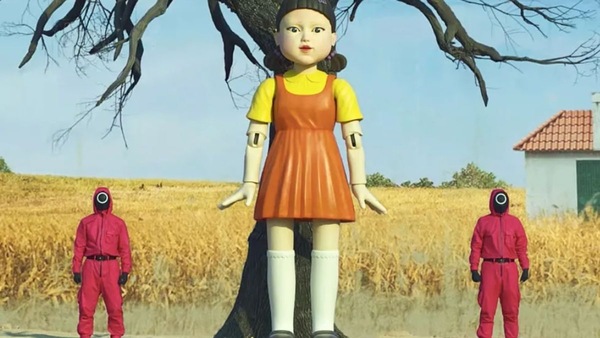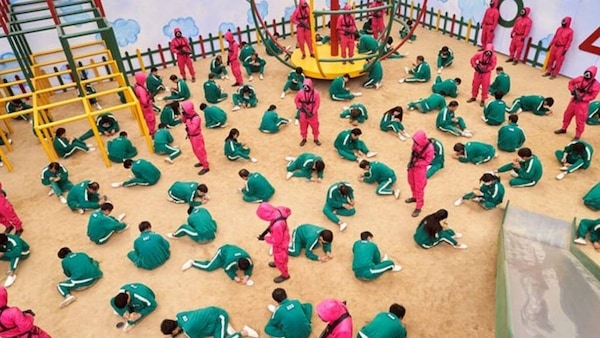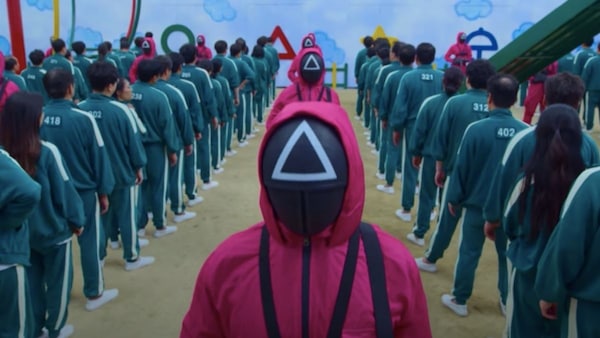Netflix’s Squid Game is a metaphor for modern economies and class conflict
Netflix’s Squid Game works purely as an entertainer, enthralling viewers in the bizarre world of gaming. At the same time, it is also a commentary on the socio-economic structures that manufacture human suffering.

Last Updated: 02.31 PM, Jun 09, 2023
Let me warn readers that this is not a typical ‘review’ of Netflix’s most popular web series to date, but rather an analysis of the show and the metaphors it so cleverly hides – or doesn’t. I may give out spoilers, so if you haven’t watched the show, you can stop reading from here on.
Let’s briefly look at the story outline: a secret organisation conducts games in a remote island off the coast of South Korea. These are simple games played in childhood, but one pays with their life if one fails at them. The total prize money is $45.6 billion and there are 456 participants. Every time a participant is killed, their share is added to the prize money, and the last person standing bags the entire amount. All the participants are carefully selected, and all of them are in desperate need of money. That’s the only thing common between them all.
There is also a Pakistani immigrant thrown in the mix. The protagonist is Seong Gi-hun (played by Jung-jae Lee), a struggling single parent who has lost most of his money in gambling and is a typical working-class guy. His wife has left him and married another man. He is trying to fight for his daughter whom the wife and her new husband plan to take to America. The only way he can prevent her from leaving is if he can prove he has the financial backing to support her.
Then we have another competitor, Cho Sang-Woo (played by Hae-soo Park), an MBA who has squandered his wealth in the stock market. He is Seong Gi-hun’s childhood buddy. The only difference is Cho Sang-Woo studied hard, completed his MBA and bagged a handsome job in the corporate world. His mother, who runs a fish stall, is unaware that her son has pledged her fish stall and gambled the money away.
The final game, which is a weird Squid Game played by Korean children, is set between Seong Gi-hun and Cho Sang-Woo. No prize for guessing who emerges the ‘winner’.
The story works on two levels, one is the obvious one, a twisted and macabre game played by masked people for the pleasure of a group of ‘foreign’ masked VIPs. The story has its typical twists and turns and cliffhanger moments.

It’s the metaphoric subtext that makes this web series even more interesting. This whole Squid game is being watched by a bunch of “VIPs” who come to the island to watch the final two games being played, live. All these “VIPs”, although masked in shiny expensive animal-shaped masks, speak English in various accents. They represent the nations with economic power; this becomes even more evident when one of these VIPs actually blurts something out in Chinese.
Now it’s obvious these “VIPs” take vicarious pleasure in watching common folk suffer as they fight against each other to gain economic freedom. The games are simple, yet if you lose, you pay with your life. It’s the daily struggle of the common man who becomes a victim of the ‘games’ played by International economic superpowers.

The contestants are in the ‘game’ not because they like to be, but because they have no other choice. The system makes it very clear, you either play the game of death and try and survive or just die anyway under economic strain. The bunch of contestants represent a cross-section of Korean society. There is a refugee from North Korea who runs away to find a better life in South Korea, there is a Pakistani immigrant, Ali (played by an Indian actor Anupam Tripathi) who works illegally in the country and needs the money to save his wife and kid. There are others as well with different problems, all created by economic hardship.
But the main two characters, Seong Gi-hun and Cho Sang-Woo, represent two pillars of any modern economy, the first is the hard-working labour class, that actually do physical work to survive and support the economy and then the white-collar, corporate class that actually run the financial systems of the economy. The folks that sit in air-conditioned offices and can make millions just by a few taps on their computers.

Both these classes have their own inherent problems. The working class suffers exploitation in the form of being overworked and underpaid, and the corporate class desires more and more and eventually falls prey to their own greed. We have seen umpteen such cases of both classes in the real world. Seong Gi-hun and Cho Sang-Woo represent these two classes and the final showdown is not as much between the two characters as it is about their classes. The writer-director of the series, Dong-hyuk Hwang, is surely sending out a message that’s not so ‘hidden’ here: we must stop fighting with each other and see the ‘game’ being played by countries with economic powers. These countries, represented by “VIPS” in the series, don’t really care if the people of the country live or die, they just want to have some ‘fun’ and the expense of the exploited population.
Later on, towards the end of the show, we learn that the person behind this macabre game is none other than an old man who pretends to be a participant and actually mingles with the other participants. He suffers from a brain tumour that can kill him at any time. Again, here the metaphor is that it’s the people from the ‘old economy’ that have invited these ‘foreign’ powers to play with the lives of common folks.
The brilliance of the series is that it works purely as an entertainer, enthralling the viewer with its bizarre storyline and macabre visuals of bodies being ripped apart. At the same time, Squid Game is a social commentary of the condition of socio-economic structure that creates human suffering. A hardship that drives humans to forget their humanity and become mere players at the hands of foreign economic powers.

